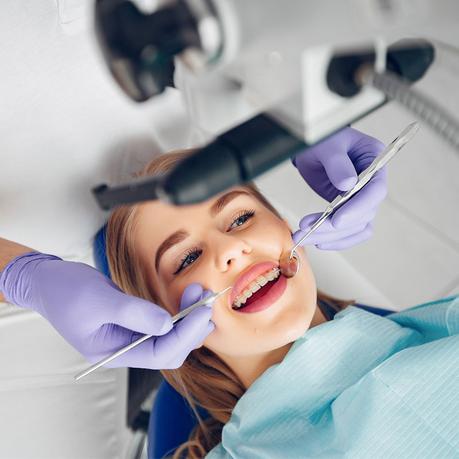
If you occasionally have bad breath, sometimes called halitosis, you’re not alone. Some studies show that fifty percent of adults have had bad breath at some point in their lives. There are several possible causes, ranging from the harmless to the serious. And what would you guess is a major cause of bad breath?
It’s oral Microflora. While flora might sound rosy, there are hundreds of types of bacteria that are naturally found in your mouth. And it doesn’t smell roses. Your warm moist mouth works as a perfect hothouse for bacteria to grow. After you eat, that bacteria goes to work consuming food particles left in your mouth and secreting waste known as volatile sulfur compounds. It’s these compounds which smell like rotten eggs that cause bad breath. Over-the-counter mouthwashes can help kill bacteria or neutralize and temporarily mask bad smelly compounds.
The longer you wait to remove those food particles by brushing and flossing, the more likely your breath will offend. Most of the bacteria that cause bad breath are found on the back of your tongue.
The White Tongue, Bad Breath Conundrum
Stick out your tongue and look way in the back. you’ll probably see a white or brownish coating — that’s where most of the bad breath bacteria hang out. So when you brush twice a day, remember to brush your tongue to get rid of it.
You can also use a tongue scraper. Studies have shown that tongue brushing reduces bad breath measurements by seventy percent. If you wear removable dentures, take them out at night and be sure to clean them thoroughly before using them again the next morning. Another cause of bad breath is dry mouth.
Your saliva works around the clock to wash out your mouth, so if you don’t have enough saliva, your mouth isn’t getting clean enough.
This can be caused by various medications, salivary gland problems or simply by breathing through your mouth.
You might try sugar-free gum or sucking on sugar-free candies to help generate more saliva, or your dentist may recommend artificial saliva. Persistent bad breath or a bad taste in your mouth can also be a warning sign of advanced gum disease which is caused by plaque. Your dentist can help bring your gums back to a healthy state. Now, if your dentist rules out the causes mentioned here and you brush and floss your teeth every day, bad breath may be the result of another health problem such as a sinus condition, diabetes, liver or kidney disease, in which case you would want to see your family doctor.
What Causes Bad Breath?
There are several reasons you might have bad breath, also known as halitosis. Some of them are:
- Bacteria
- Dry Mouth
- Gum Disease
- Tobacco Use
- Food
- Medical Conditions
QUALITY AFFORDABLE DENTAL IMPLANTS
Copperhills Family Dentistry specialists provide specialized dental services that help our patients cultivate healthy and happy smiles. We’re happy to provide compassionate care coupled with cutting-edge technology.
Dental ImplantsHow to prevent or treat Bad breath?
In the majority of cases, the cause of halitosis is located in the mouth and not in the throat, nose or ears, or the digestive system. Good oral hygiene is essential in treating halitosis. Optimum oral health through good oral hygiene can be achieved by:
- regular dental visits which include professional cleaning and checkups
- Brushing your teeth and tongue with fluoride toothpaste twice a day
- using a sauce or interdental cleaner between your teeth every day
- removing dentures at night, soaking them in antibacterial solution and thoroughly cleaning them before using them in the morning.

Whitening cosmetic
dentistry dental
Veneers
Treatment of Halitosis also Involves:
- avoiding foods, which include alcohol and caffeine, that cause bad breath
- Eating vitamin C-rich foods and vegetables like celery and carrots
- drinking plenty of water and sucking on sugarless gum or lozenges
- the use of tongue scrapers to thoroughly clean the tongue of bacteria trapped
in its - avoiding breath mints and mouthwashes that may contain alcohol
- applying a few drops of peppermint or tea tree oil onto your toothbrush or tongue
- drinking green tea and the use of mouth
- washes that contain settled PI radium chloride, chlorhexidine, zinc gluconate, essential oils and chlorine dioxide
A few more things to Prevent Having Bad Breath
Quit smoking- Smoking increases the chance of developing halitosis through bacterial build-up inside the mouth which results in plaque formation.
If consuming caffeine is unavoidable, rinse your mouth with plain water after drinking.
Your general practitioner can give you more information about the disorder and its possible treatments.
To Reduce or Prevent Bad Breath, Do the Following:
- Brush and Floss
- Clean Your Dentures
- Rinse with Mouthwash
- Keep Your Saliva Flowing
- Quit Smoking
- Visit Your Dentist Regularly
What’s the connection between tonsil stones and halitosis?
Tonsil stones are soft calcifications of germs and food that collect in the pits or folds around tonsils. One study that analyzed 49 people with bad breath revealed that 75% of them had tonsil stones.
This data supports the idea that tonsil stones are a major contributor to halitosis.
Tonsil stones contain VSC-producing bacteria. This means that they can give off a powerful odour that makes breath stink. If you suffer from tonsil stones, then you may be releasing their foul scent with every breath you exhale. The odour can be so overwhelming that the stones may affect your sense of taste, as well.
Bad breath. The main sign of a tonsil stone is severely bad breath, or halitosis, that comes along with a tonsil infection
- Persistent sore throat
- Trouble swallowing
- Cough
- White debris
- Trouble swallowing
- Ear pain
- Tonsil swelling
- Pain
- The sensation of a foreign object in the back of your throat

